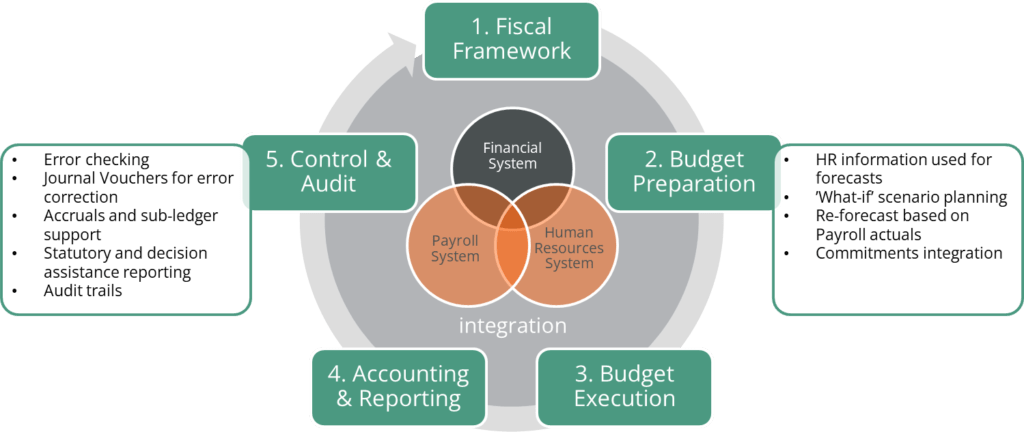In a government, there are many different responsibilities that need to be fulfilled. From managing public finances to providing public services, governments have a huge workforce that need to be efficiently and effectively managed so that they can deliver on their mandate to citizens. Civil service management is therefore an important function within a government and it is critical that the right policies and systems are in place.
As a leading Public Financial Management (PFM) solutions and advisory services firm, FreeBalance’s government-bespoke software was designed for the unique requirements of the public sector. The (CSM) Civil Service Management pillar of the FreeBalance Accountability Suite™ is a case in point. Developed exclusively for government, it not only provides all standard human resource management functions but it also enables and supports civil service reform.
What is Civil Service Management?
The civil service is a professional body of employees that work in the public sector. The main role of civil servants is to help the government run the country, but they also have a responsibility to help deliver public services and support the government’s policies. Civil servants also play an important role in providing advice and support to ministers and other government officials.
Civil Service Management (CSM) is the process of recruiting, selection, training, developing, compensating and managing public sector employees. This includes the development of CSM policies that are designed to help governments achieve their strategic objectives and manage their workforce in a more effective and efficient way. Such policies ensure that civil servants are properly equipped to carry out their jobs and that they are motivated and productive workforce. CSM policies can be used to attract and retain talented staff and to improve morale and motivation.
Good civil service management also requires specialized CSM systems such as the FreeBalance Accountability Suite™ which provides government administrators with a fully integrated management tool that they can use to manage the entire civil service cycle from recruitment to retirement.

In recent years, there has been an increasing focus on the quality of the civil service which has led to a greater emphasis on the need for civil servants to have the necessary skills and competencies to carry out their roles effectively.
What Are the Benefits of Civil Service Management Systems?
The role of civil servants is to provide efficient and effective government services to the public. They are responsible for ensuring that government policies are implemented properly and that services are delivered effectively. Civil servants also play an important role in providing advice and support to ministers and other government officials. In order to carry out their duties effectively, civil servants must have a good understanding of the policymaking process and be able to work well with other government departments and agencies.
To make sure that the civil service is performing optimally, governments need to use CSM systems such as the FreeBalance Accountability Suite™. Having a CSM system that is fully integrated with the rest of the Government Resource Planning (GRP) solution ensures that CSM policies are determined and decisions are made within the context of the overall government mandate and the government’s performance.
Other benefits are the ability of the system to manage:
- Recruitment, performance appraisal, dispute management and retention processes
- The payment cycle including approval, EFT, secure cheques and pay vouchers to hourly and salary staff, and pensions to former civil servants
- Salary forecasting and the ability to model changes to pay grades, vacancies and union agreements
- Sets the establishment for the civil service, pay grades and position scales
- Vendors including vendor authorization, certifications and ratings
- Insurance, bonuses, training payments and loans for civil servants
Civil service management systems also increase government capacity through training, capacity building programs, succession planning and pay for performance.

Civil Service Management and Civil Service Reform
There is a growing recognition that the civil service needs to be more effective in order to meet the challenges of the 21st century. Around the world governments have introduced a number of initiatives to improve civil service effectiveness, including the civil service reform plans.
One of the key elements of reform plans is to improve human resources management (HRM) in the civil service. The aim is to create a more efficient and effective workforce that is better equipped to deal with the challenges of the future. A key part of this is building government capacity and improving performance management.
Civil service reform initiatives are creating teams that are better equipped to deal with challenges and that are delivering results for taxpayers.
Conclusion
In recent years, there has been an increased focus on the role of civil servants in policy making and implementation, as well as on their contribution to the development and reform of government. Civil service management and CSM systems play a vital role in ensuring that government is able to attract, develop, and retain the talent it needs to deliver high-quality public services.
To learn how FreeBalance could improve civil service management in your country, please get in touch.